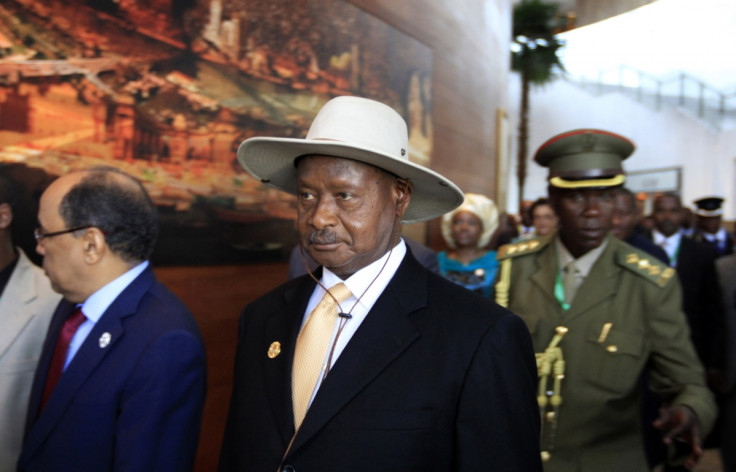Uganda: President Museveni receives gay animals book for Christmas over anti-homosexuality law

Uganda's President Yoweri Museveni has received a book on homosexuality in animals for Christmas as the Parliament tries to pass an anti-gay bill before the end of the year.
German online dating company Gleichklang sent Museveni Biological Exuberance - Animal Homosexuality and Natural Diversity, by Canadian biologist Bruce Bagemihl.
The book, sent to the presidential office in Kampala, documents cases of homosexuality in 450 species.
"We are a dating service for people of all sexual orientations and our move is a symbolic protest against homophobia and a sign of solidarity with all people who are persecuted because of their sexual orientation," Dr Guido F Gebauer, psychologist at Gleichklang, told IBTimes UK.
"The president has not tried to contact us. However, we hope that he might hear of our campaign and the book we have sent to him. The more publicity our move gets, the larger the contribution might be."
The Christmas present follows growing concern that gay Ugandans will face persecution if the bill is implemented.
Homosexuality is already a crime in Uganda. However, under the proposed new law:
Members of the LGBTI community will risk seven years' imprisonment and the exclusion from employment due to the criminalisation of those who 'aid and abet' the promotion of homosexuality.
People who own property in which "unnatural sexual practices" occur will be criminalised.
Activists and advocates in the LGBTI community will be banned from publishing, broadcasting and distributing information "intended to facilitate" homosexuality or providing funding that is viewed as promoting homosexuality.
Gebauer defined the anti-gay bill as a "backward anti-human rights approach which finally produces negative publicity for Uganda and Africa in general" and said that Gleichklang urges Museveni to "follow the footsteps of the great African role model Nelson Mandela and accept homosexuality as natural variant of human and animal life.
"Behind the anti-gay legislation in Uganda are also Western Christian fundamentalists who have lost their battle against gay rights in their home countries but have chosen Africa to continue their fight against gay people at the expense of the African continent."
Uganda's anti-gay bill
The draft law was first put forward in 2009 by MP David Bahati. It originally proposed a death sentence for homosexuals.
The proposed legislation, which was later amended and condemned gay Ugandans to life imprisonment, was dropped two years later, after the murder of Ugandan gay rights activist David Kato sparked international outcry.
It was only in 2014 that Museveni signed the bill into law, prompting many countries to condemn his decision to criminalise homosexuality.
Museveni signed the bill after he allegedly consulted a group of experts, who claimed homosexuality is "not genetic but a social behaviour".
Shortly afterward, however, the law was annulled by the constitutional court on the grounds that it was not passed with the necessary quorum of support.
According to 2014 Nobel Peace Prize nominee Frank Mugisha, who is executive director of Uganda's umbrella organisation Sexual Minorities Uganda (SMUG), if the bill is implemented gay Ugandans will be homeless and jobless as employers and landlords will risk persecution if they are accused of supporting homosexuality.
"This bill is not just about homosexuality, it could criminalise anyone working on LGBT issues," Mugisha told IBTimes UK.
"If the bill is signed to law, many landlords will fear prosecution and will refuse to give a house to anyone suspected of being homosexual, with a result that gay people will not be able to rent and will end up being homeless," he continued.
"Gay Ugandans will also have difficulties in finding a job as the bill criminalises people suspected of 'aiding and abetting' the promotion of homosexuality," he said.
© Copyright IBTimes 2024. All rights reserved.






